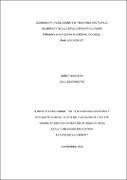| dc.contributor.author | Nandera, Miria | |
| dc.date.accessioned | 2022-03-05T12:17:43Z | |
| dc.date.available | 2022-03-05T12:17:43Z | |
| dc.date.issued | 2019-11 | |
| dc.identifier.citation | Nandera, Miria (2019) Community involvement in teaching and pupils’ numeracy skills development in lower Primary in Nansana municipal council, Wakiso district | en_US |
| dc.identifier.uri | https://kyuspace.kyu.ac.ug/xmlui/handle/20.500.12504/801 | |
| dc.description | xii, 88 p. ; | en_US |
| dc.description.abstract | Evidence shows that children’s early development of numeracy skills acts as a foundation for future specialization in technical professions. Ugandan children are taught numeracy regularly, but, the country is ranked second in the world with less proficient children in numeracy where Wakiso district has 45.7%. Basing on the Situated Cognition Theory and using a cross-sectional survey research design, this study aimed at establishing whether community involvement in teaching using every day occurring practices and activities develops pupils’ numeracy skills. The objectives were to establish the community involvement practices used to support the development of numeracy skills in pupils; to identify and examine activities that children participate in the community that develop their numeracy skills; and the relationship between pupils’ participation in these activities and their numeracy performance at school. Data were collected through questionnaires, interviews, focus discussion groups and observations from 193 randomly and purposively selected participants who included 28 teachers, 32 parents, 20 community elders and 113 pupils. Findings of the study indicate that involvement of children in home chores; family business; giving responsibilities, money saving habits and sending children to nearby shops are the practices that develop numeracy skills in pupils. While counting items, buying groceries, cooking, fetching water and washing were the activities pupils participate in. This study also found a statistically significant positive relationship (r = .577, p= .000) between pupils’ participation in activities in the community and their performance in numeracy at school. The study concluded that the numeracy related practices and activities in the community provide opportunities to promote children’s numeracy skills development although parents are not aware of it. It is recommended that Parents be supported to use identified activities to develop children’s specific numeracy skills. | en_US |
| dc.language.iso | en | en_US |
| dc.publisher | Kyambogo University [unpublished work] | en_US |
| dc.subject | Community involvement | en_US |
| dc.subject | Teaching | en_US |
| dc.subject | Pupils’ numeracy skills development | en_US |
| dc.title | Community involvement in teaching and pupils’ numeracy skills development in lower Primary in Nansana municipal council, Wakiso district | en_US |
| dc.type | Thesis | en_US |

